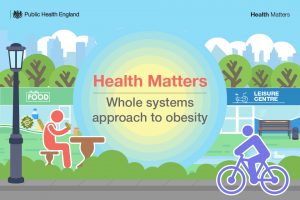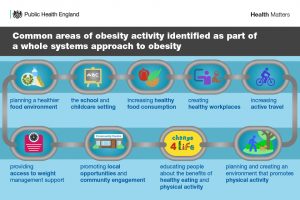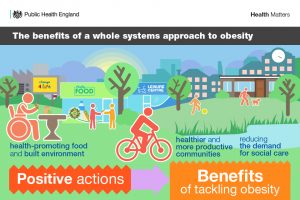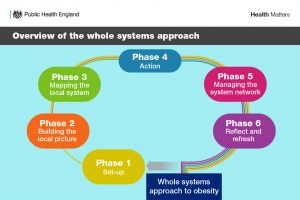
The latest edition of Health Matters, PHE’s professional resource, focuses on taking a whole systems approach to addressing obesity using PHE’s newly published guide, which supports local approaches to promoting a healthy weight.
This blog provides a summary of the full edition’s content.
Taking a whole systems approach to obesity
Excess weight is driven by environmental, societal and individual factors. The scale of the problem and its relationship to a number of diseases is well documented, and it is a leading cause of ill-health in England. Local authorities are committed to playing their part in tackling the problem.
A growing body of evidence suggests that a whole systems approach could help tackle complex problems, such as obesity, and an increasing number of local areas across the UK are testing and embedding a systems way of working.
PHE’s newly published guide – Whole systems approach to obesity: A guide to support local approaches to promoting a healthy weight – has been developed over the past 4 years in collaboration with local authorities, Leeds Beckett University, the Association of Directors of Public Health, and the Local Government Association.
The guide is intended to support local areas and their communities to deliver the key principles outlined in What Good Healthy Weight for all ages Looks Like. It will enable local authorities, and their partners, to start creating their own local whole systems approach to addressing obesity and promoting a healthy weight.
The identification of locally appropriate actions to include in the approach is supported by PHE’s Promoting health weight in children, young people and families: a resource to support local authorities.

The benefits of applying a whole systems approach to obesity
A local whole systems approach to obesity is a ‘Health in All Policies’ approach, which draws on local authorities’ strengths, supports their priorities, and recognises that they can create their local approaches more effectively by engaging with their community and local assets.

Most local areas interested in setting up a localised whole systems approach will already have strategies and programmes of work in place to tackle obesity. A whole systems approach can add value to this by providing the opportunity to engage stakeholders across the wider system, to develop a shared vision and actions that tackle the upstream drivers of obesity outside the realms of public health. The approach should be agreed collectively by local stakeholders to reflect the local context.
In addition to benefiting people’s health, delivering a more health-promoting and vibrant environment can contribute to issues like reducing air pollution and litter, as well as supporting local businesses and workforces. Maintaining a healthier workforce could also have positive impacts on other long term local agendas, such as employability and productivity of local populations, as well as the demand for social care.
Understanding these benefits enables engagement with different stakeholders in the whole systems approach.
Putting a whole systems approach into practice
PHE’s guide provides information on how to put a whole systems approach to obesity into practice. This includes a 6-phase process that can be used flexibly by local authorities, taking into account existing structures, relationships and actions that are already in place.

It is clear that no one organisation has all the answers or responsibility to tackle obesity. In addition to local authorities, other system partners including the NHS, local businesses, communities and the voluntary sector play a role in implementing a whole systems approach to obesity.
For example, there are various opportunities through the NHS and its commissioned services to promote healthy weight across the life course. As one of the largest employers in England, the NHS also has a role to play in keeping its own staff healthy through, for example, supporting staff access to lifestyle behaviour services.
Involving local communities in the approach will help ensure that the resulting programme of work takes account of the views, knowledge and priorities of the communities who are, ultimately, the beneficiaries of whole system efforts to address obesity.
Visit the Health Matters area of GOV.UK or sign up to receive the latest updates through our e-bulletin. If you found this blog helpful, you can read other Health Matters blogs.

2 comments
Comment by Tracy O'Neill posted on
A culture of healthy well being needs to be established in primary schools right up to higher education. We need to learn from our ancestors. Food chains also have a responsibility to produce healthy food. We are becoming a chemical nation depending on chemicals.
Comment by Marie Weeks posted on
With council contractors using glyphosate containing products (RoundUp) on grounds around schools , in local parks , pavements and gardens of social housing . We need pesticide and herbicide free environments for children to grow in a healthy way . It also kills wild life . Bees have been almost wiped out in my piece of garden this year. Round Up containing glyphosate is still being sold in my local Sainsbury's ! Annd will be used in local gardens . Glyphosate has been sprayed on the gardens in my housing association without informing residents . I have for five years been eating produce from the garden that was believed to be organic as it was carefully grown by residents but it has been routinely poisoned by contractors . I now have brain damage showing up in scans , terrible gut problems which the nhs has been unable to help me with and which prevent me living a normal life , I eat a third of what I used to eat but have not lost a single pound . I do not recognise my body - it does not work properly anymore , I fall a lot , walking is often more of a shuffle and I am in a mental fog . The NHS does not seem to have a urine test for glyphosate yet glyphosate is known to cause so many health problems . The Nhs has wasted 5 years and a lot of money trying to help me but with out-dated attitudes to gut problems . Please allow our doctors to give us the urine test for glyphosate . The evil stuff is in most children's breakfast cereals and therefore in most children . These kids don't stand a chance of a good life with this poisonous start in life .